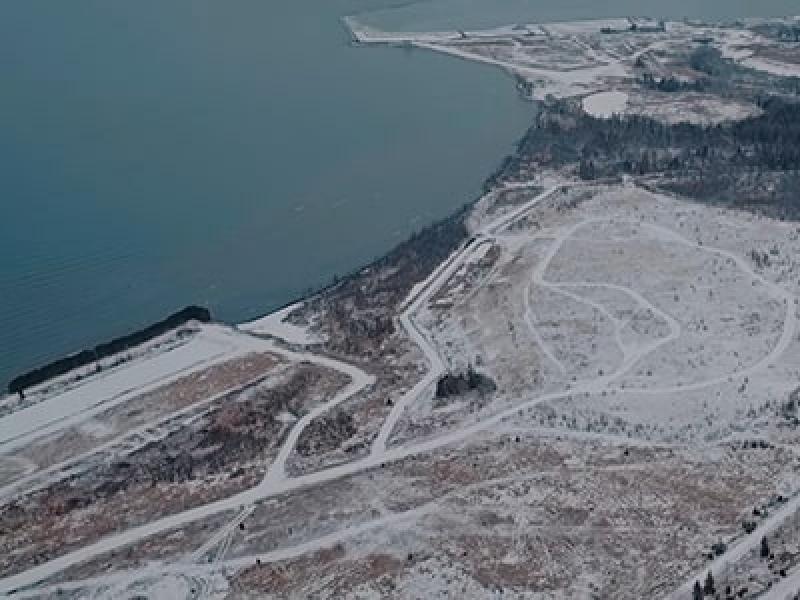
Avalon Advanced Materials Inc. has taken two major steps toward its goal of vertically integrating North America’s lithium supply chain, including a $63 million investment from SCR-Sibelco NV and acquiring a Thunder Bay industrial site.
As a result of the investment, Antwerp-based Sibelco now owns approximately 19.9 per cent of Avalon’s (AVL-T) shares. The investment will help fund acquisition of the site, which will become a lithium-hydroxide processing facility in Thunder Bay, and repayment of up to $1.9 million of existing debt.
Financial terms of the Thunder Bay acquisition were not disclosed.
“This is a combination of quite an extensive search by our team. We've been looking at various sites in the province and, frankly, in other provinces and in . . . the U.S. as well. But Thunder Bay for many obvious reasons is an excellent choice for us,” Zeeshan Syed, Avalon’s president, told SustainableBiz.
“It's been a historic midway point between connecting resources in the north and international markets in the south. The site in particular that we've acquired is over 300 acres, 100 of which is in the water.”
Lithium hydroxide is used in the production of cathode materials for electric vehicle (EV) batteries.
Sibelco mines, processes and sells minerals like silica, clays, feldspathics and olivine for a range of industries including semiconductors, solar photovoltaic, glass, ceramics, construction, coatings, polymers and water purification. The Sibelco Group has production facilities in over 30 countries and a team of over 5,000 worldwide.
The Thunder Bay site at 965 Strathcona Ave. has the capacity for three refineries. The first will have the capability to process 22,000 tonnes of lithium hydroxide annually. It also has existing road, rail, deep-water port and utilities services.
Avalon’s executive changes
Toronto-based Avalon recently made several changes to its executive roster, with Scott Monteith joining as interim CEO, Jim Jacques as the chief administrative officer and Jan Holland joining the board of directors.
“We have a very clear mandate to turn Avalon into a company for the future. We're very execution-focused, results-oriented. We want to ensure that we have a very succinct, focused mandate, and hence why we're looking at our lithium assets as stage and Phase No. 1,” Syed said. “We want to be very clear to the market that there is strategy, there's a plan, there's timelines and there's people at the helm who are going to be driving the ship.”
Syed was appointed president in March after joining Avalon in 2019. Former president and CEO Donald Bubar also stepped down from the board of directors.
Avalon’s vertical lithium integration
Syed estimates the entire vertically integrated project – the Thunder Bay facility and its Canadian lithium mining operations – will cost around $1 billion.
The facility’s square footage is currently being determined, although Syed explained Avalon has a “very strong sense” of a 48-month timeline to completion.
“That's part of the initial work that needs to be done, is some of that site preparation, basic engineering and some of the feasibility on the site itself, just get the site ready for that construction,” he said.
“So there's a lot of answers (that) will be revealed there. But we're looking around, a few of our peers (like) Piedmont Lithium in Tennessee (and) Tesla, what they've started in Texas, and a few other examples around the world, we're all in and around the same rate: 20 to 25,000 tonnes.”
The facility will create around 500 jobs in Thunder Bay and Kenora. Aside from emphasizing supply chain efficiencies via its proximity to transport, Avalon also hopes to develop processes that improve on sustainability via collaboration with other companies.
He also referred to a potential joint venture partner in the refinery, as well as integrating First Nations partners as part of the economic development.
“We're talking to a leading international player in this space. Battery technology is evolving . . . so part of the discussions we're having with prospective partners to come in is to ensure that whole life-cycle analysis,” Syed said.
“We're looking at the feedstock coming in, we're looking at the conversion process in the refinery itself and making sure to the extent possible, we can demonstrate this is leading edge, AI-driven, and very much accentuating our environmental footprint within the facility itself.”
Avalon’s lithium, a form of the mineral known as petalite, will largely come from its Separation Rapids lithium project in Kenora and its Lilypad Spodumene-Cesium-Tantalum project in the northern community of Fort Hope, Ont.
“Outside of Zimbabwe, and China's control, we've got the only known source (of petalite lithium) in the Western world,” Syed said.
Avalon’s future plans
Avalon is in discussions with a few companies and academic institutions in Canada on implementing technology to extract valuable minerals from acid rock drainage and tailing ponds at all of its sites.
For its East Kemptville tin mine in Yarmouth, N.S., Syed said there are active discussions with a research facility in the U.S. to recover those minerals in the waste.
Once the company has a vertically integrated lithium supply chain, it will service the EV battery market as well as the ceramics market via its Sibelco joint venture.
“For the EV battery production side, there's a lot of heartburn in that sector,” Syed said. “But Avalon’s financial and production model has always been to serve two markets. And I think that's what really differentiates us in the marketplace.”










